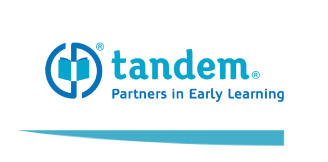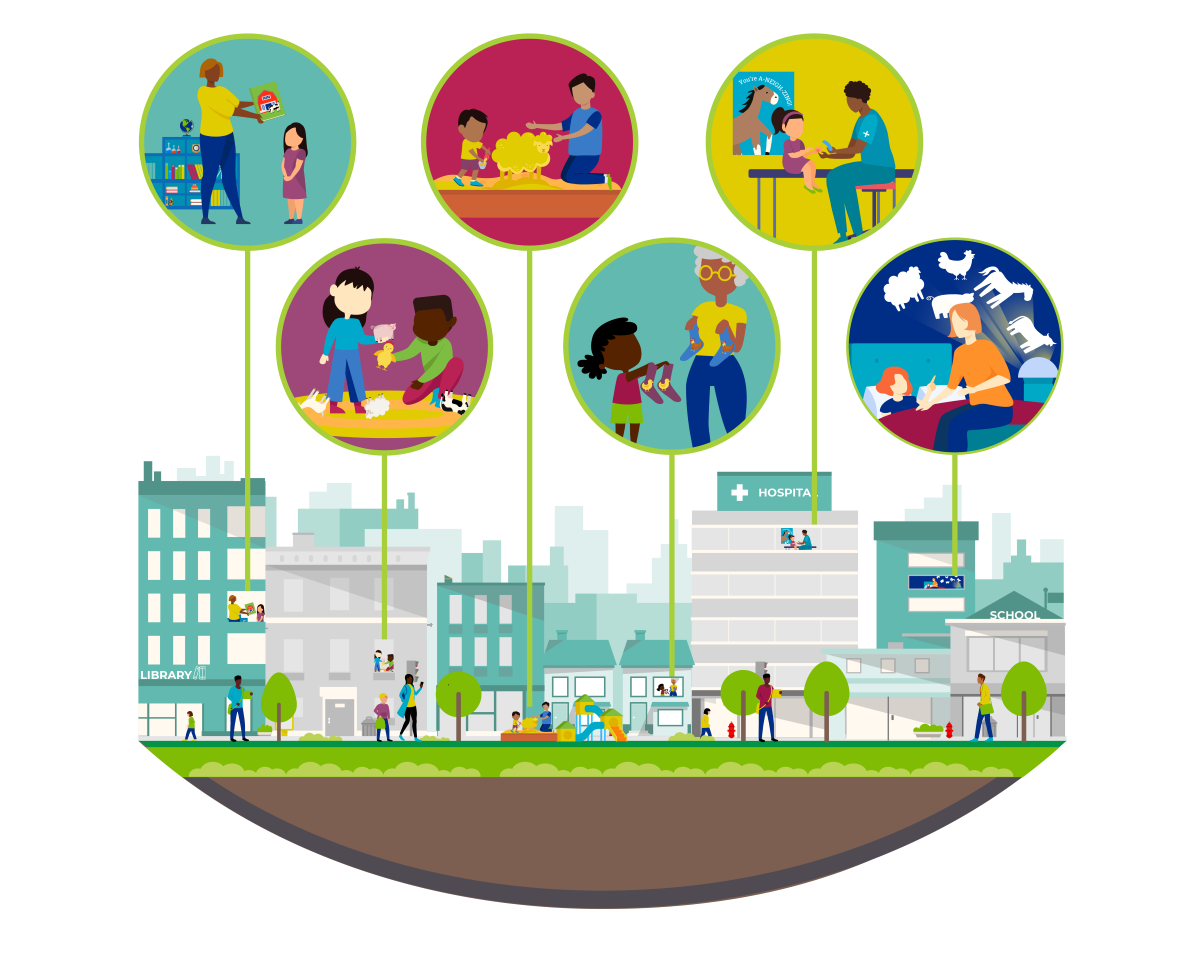Finding Hope and Home: What I’ve learned working with refugee families
My grandmother passed away in Iran recently. As I returned to the United States from her funeral, amidst my sadness, I began to think about how hard it is to lose someone who lives so far away, and ultimately began to think about why I ever moved to the United States in the first place. I also thought about the privilege I have to have been able to go home to say goodbye to her, and to be able to come back to my new home.
I was born and raised in Iran, and I moved to the United States when I was 17 years old. When I moved to this country, I was a typical 17-year-old; full of hopes and dreams. I came with full force; determined to go to college. I knew that I would have to take care of myself financially, as my family did not have the means to support me abroad. I had a green card (permanent residency), and I considered myself lucky just to have the option of leaving the country; so I was okay with having to struggle to pay my bills. I had other resources: the privilege of being able to choose to emigrate, the determination of a young woman, and I also had a plan.
I moved to Los Angeles to live with my aunt, who had visited us often during the hot summer days in Tehran; her suitcase was always full of candies and American gifts! I never forget how welcoming she was the first night I entered the room she had carefully prepared for me. Nevertheless, I walked in, sat down on the floor, and began sobbing. What have I done? What am I doing here in this so unfamiliar place?
It has been 10 years since I walked into that room, and I am not going to lie: I still ask the same questions of myself sometimes.
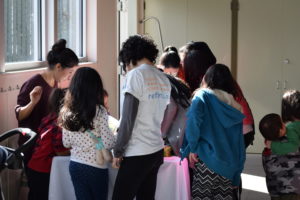 Eventually though, as an immigrant, I did what I came here to do. I had made a conscious choice to leave home for a brighter future and better opportunities. I put myself through high school, a full time job, and Community College. I worked full time for a while, so that I could finally attend UC Berkeley—the one university that I always wanted to attend. In 2012, I walked down the aisle with a Bachelor’s degree in Peace and Conflict Studies and immediately began my career working to resettle newly arrived refugees in Oakland.
Eventually though, as an immigrant, I did what I came here to do. I had made a conscious choice to leave home for a brighter future and better opportunities. I put myself through high school, a full time job, and Community College. I worked full time for a while, so that I could finally attend UC Berkeley—the one university that I always wanted to attend. In 2012, I walked down the aisle with a Bachelor’s degree in Peace and Conflict Studies and immediately began my career working to resettle newly arrived refugees in Oakland.
When I began this work helping refugee families seek and apply for jobs, I learned that academically I may have been familiar with the term “refugee,” but the nuances of being one—I was not so familiar with.
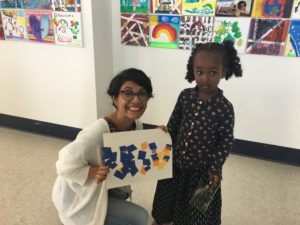 Oakland’s refugees and I had in common the frustrations of settling in a new country, adjusting to a new culture, and the fact that we all simply missed home, but there was something about their stories that was also very different. I often found myself sharing my own experiences to help relieve them from disappointments or even hopelessness. After all, I had come to the United States, and my own determination and my plan had helped me overcome disappointments and stay hopeful. Couldn’t these newly arrived families, too, stay determined and focused on a plan to deter their own hopelessness?
Oakland’s refugees and I had in common the frustrations of settling in a new country, adjusting to a new culture, and the fact that we all simply missed home, but there was something about their stories that was also very different. I often found myself sharing my own experiences to help relieve them from disappointments or even hopelessness. After all, I had come to the United States, and my own determination and my plan had helped me overcome disappointments and stay hopeful. Couldn’t these newly arrived families, too, stay determined and focused on a plan to deter their own hopelessness?
This is when I started to recognize my privilege. Of course my journey as an immigrant was difficult, but to many, I was that independent Iranian girl who came to the United States and pursued her own American dream. My story was a story of courage; I made a choice to move from one place to another despite all difficulties, and indeed I overcame the challenges.
But what was humbling in working with refugees was that there were thousands more stories that made emigration a much greater act of courage and resiliency than mine, and for refugees, pursuing the American Dream was much more nuanced than simply having a career and a house. The refugee families I worked with did not necessarily make a choice to move across the oceans, perhaps did not even plan for it, and yet despite all challenges, these amazing people kept going, hoping, and dreaming of a better future. That to me seemed so much more courageous.
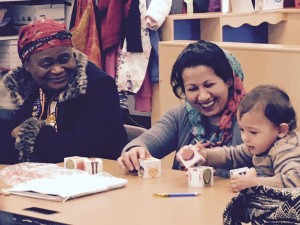 My new refugee friends came from Afghanistan, Burma, Bhutan, Democratic Republic of Congo, Eritrea, Iran, Iraq, Syria, Uganda. They left their countries due to persecution, discrimination, violence, and war. Unlike me, they did not make the choice; they were forced to leave. Unlike me, almost none got to plan their future. They were forced to leave home. They packed their bags with the hope that the future will just be better and a commitment to do whatever it takes to build a new, safe life for their families.
My new refugee friends came from Afghanistan, Burma, Bhutan, Democratic Republic of Congo, Eritrea, Iran, Iraq, Syria, Uganda. They left their countries due to persecution, discrimination, violence, and war. Unlike me, they did not make the choice; they were forced to leave. Unlike me, almost none got to plan their future. They were forced to leave home. They packed their bags with the hope that the future will just be better and a commitment to do whatever it takes to build a new, safe life for their families.
When I moved to the United States I was hopeful, but privilege, determination, and a plan helped me make a commitment to create a better future. I rarely embraced the unknown, or committed to hopefulness. I often spent my time planning, relying on the fact that my organizational and planning skills would get me to where I had to go.
In working with refugees, it became evident and humbling to see so many committing to hopefulness first, trusting the unknown, and then committing to make a plan with whatever may come of it. In the three years I spent working with refugees, I was humbled by their resiliency, their strength, and their incredible commitment—even in the difficult times—to the hope that surely says things will get better.
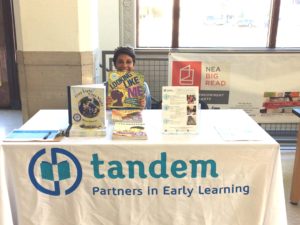 Today, I am proud to be working with Tandem, Partners in Early Learning, which is committed to all families having access to every opportunity to prepare their young children for success in school. Strong partnerships with organizations working with immigrants and refugee families and their young children are seeing to it that newcomers to our community don’t have to lean as hard on hope, because there are people here who know the strength and commitment of newcomers, and are excited to provide the resources and support they need to move forward with their new lives. Children’s school readiness predicts much about their success in school and in life. For new families, this investment in their youngest members is critical to ensuring the risks and trials they’ve endured will be worth it.
Today, I am proud to be working with Tandem, Partners in Early Learning, which is committed to all families having access to every opportunity to prepare their young children for success in school. Strong partnerships with organizations working with immigrants and refugee families and their young children are seeing to it that newcomers to our community don’t have to lean as hard on hope, because there are people here who know the strength and commitment of newcomers, and are excited to provide the resources and support they need to move forward with their new lives. Children’s school readiness predicts much about their success in school and in life. For new families, this investment in their youngest members is critical to ensuring the risks and trials they’ve endured will be worth it.
As I mourn the loss of my grandmother and, again, wonder if I made the right choice to move away from Iran and my family, I know that I moved to the United States to be a part of a community of people committed to sharing the journeys all families take—Americans, immigrants, and refugees—their stories of resiliency and strength, and most importantly to welcome them and contribute to their hope for the bright future they envision for themselves and for their young children.
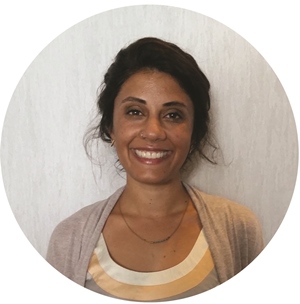
Kajal Shahali
Community Literacy Specialist
Kajal Shahali is a Tandem Community Literacy Specialist in Alameda County.
